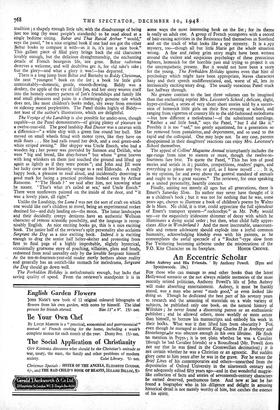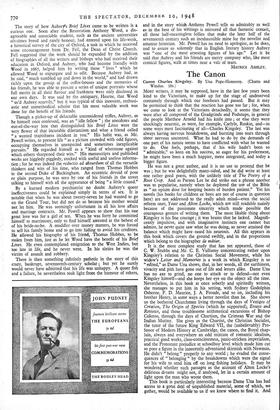An Eccentric Scholar
FOR those who can manage to read other books than the latest Hollywood scenario or the not always reliable memories of the most recently retired politician, Anthony Powell's life of John Aubrey will make absorbing entertainment. Aubrey, it must be frankly stated, was a man who never "made good," or even looked like doing so. Though he dedicated the best part of his seventy years to research and the amassing of materials on a wide variety of subjects, he published only one book. on the natural history of Wiltshire ; he never found a discerning patron or an enthusiastic publisher ; and he allowed others, more worldly or more astute than himself, to borrow his manuscripts and embody his work in their boas. What was it that lifted him from obscurity ? Fox', even though he managed to interest King Charles II in Avebury and Stonehenge,•he was obscure enough in his own lifetime. He finds no mention in Pepys • it is not plain whether he was a Cavalier (though he had Cavalier friends) or a Roundhead (Mr. Powell does not say that he was fined in the aomwellian decimation) ; it is not certain whether he was a Christian or an agnostic. But sudden glory came to him years after he was in the grave. For he wrote the Brief Lives of his contemporaries and others—unearthed from the depositaries of Oxford University in the nineteenth century and first adequately edited fifty years ago—and in that wonderful magpie- like collection of facts and stories of seventeenth-century characters he earned deserved, posthumous fame. And now at last he has found a biographer who in his diligence and delight in amusing historical detail is not merely worthy of him, but catches the essence of his spirit.
The story of how Aubrey's Brief Lives came to be written is a curious one. Soon after the Restoration Anthony Wood, a dis- agreeable and unsociable student, such as the ancient universities oft-times breed and rarely honour, had entered upon his life-work, a historical survey of the city of Oxford, a task in which he received some encouragement from Dr. Fell, the Dean of Christ Church. Fell suggested that the work should be expanded by the addition of biographies of all the writers and bishops who had received their education in Oxford, and Aubrey, who had become friendly with Wood in 1667, helped him by writing those " lives " which he allowed Wood to expurgate and to edit. Because Aubrey had, as he said, " much tumbled up and down in the world," and had drawn richly upon the gossip of the coffee-houses and the memories of his friends, he was able to present a series of unique portraits whose full merits in all their flavour and frankness were only disclosed in our own days. It was said by the antiquary, Hearne, that Wood " us'd Aubrey scurvily," but it was typical of this innocent, enthusi- astic and unmethodical scholar that his most valuable work was done for the benefit of his friends.
Though a picker-up of delectable unconsidered trifles, Aubrey, as he himself once confessed, was an " idle fellow " ; the anecdotes and out-of-the-way lore that distinguished his Brief Lives were the very flower of that incurable dilettantism and what a friend called " a wonted trapishness incident in you." His habit was, as Mr. Powell writes, to present life " as a picture crowded with odd figures, occupying themselves in unexpected and sometimes inexplicable pursuits." He regarded himself as a " kind of whetstone against which others sharpened their wits." His manuscripts and published works are higgledy piggledy, stocked with useful and useless informa- tion ; for he was indeed the reductio ad absurdum of all the versatile thinkers and wits of his time, who ranged from Thomas Hobbes to the second Duke of Buckingham. An eccentric devoid of pose or plain purpose, he was seen by one of his friends in the street talking to himself with all the appearance of being " a little crazed."
By a learned modern psychiatrist no doubt Aubrey's queer ineffectiveness could be explained simply in terms of sex. It is notable that when he was about twenty-seven he had wanted to go on the Grand Tour, but did not do so because his mother would not let him. He was seemingly unfortunate in all his love affairs and marriage contracts. Mr. Powell appears to show that his one great love was for a girl of ten. When he was forty he committed himself to matrimony, only to find himself arrested at the behest of of his bride-to-be. A muddler over money matters, he was forced to sell his family home and to go into hiding to avoid his creditors. He allowed his biography of his friend, Thomas Hobbes, to be stolen from him, just as he let Wood have the benefit of his Brief Lives. He even contemplated emigration to the West Indies, but too late in life, and he never went. In his sixties he was the victim of assault and robbery.
There is then something infinitely pathetic in the story of this crazy, bankrupt, seventeenth-century scholar • but yet he surely would never have admitted that his life was unhappy. A queer fish and a failure, he nevertheless took light from the humour of others, and in the story which Anthony Powell tells so admirably as well as in the best of his writings is mirrored all that fantastic conceit, all those half-meaningless follies that make the later half of the seventeenth century such an inexhaustible mine for the novelist and amateur historian. Mr. Powell has no need to apologise, as he does, and to assure us solemnly that in English literary history Aubrey was " one of the most arresting figures of his age." Let it be said that Aubrey and his friends are merry company who, like most comical figures, walk at times near a vale of tears.
MAURICE ASHLEY.















































 Previous page
Previous page